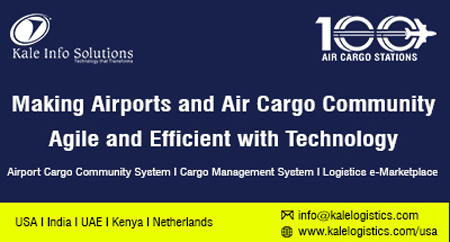
 |
| |
 |
 #INTHEAIREVERYWHERE |
| Vol. 21 No. 40 | Monday
October 24,
2022 |
| |
When Turkish Airlines recently opened their new offices in Mumbai earlier this year, India’s financial capital, and in Gurugram within striking distance of Delhi, the cargo carrier sent out a strong message that India was very much in its sights for further growth. Here Halit Tuncer, Cargo Director, South Asia tells us all about it. “Turkish has chalked out plans to add to its fleet of 20 freighters with an aim to have the widest network in the world,” Tuncer said, emphasizing that India is clearly in focus for future growth. That thinking has been in place actually for some time and has also driven expansion into Ahmedabad. Earlier TK had added Bangalore. “India’s expanding economy and robust middle class provide a lucrative market,” Halit Tuncer smiles. Burgeoning Cargo Business “India is today one of the biggest markets for world businesses. It is the world’s fifth largest economy by GDP and the third largest by purchasing power parity. India is the world’s largest manufacturer of generic drugs and its pharmaceutical sector fulfills over 50 percent of the global demand for vaccines. It’s definitely an important market for us as we serve with six stations from India. “We have seen a lot of incentive to bring in more aircraft capacity to help deliver this market to the world. “Turkish Cargo with our Mumbai SMARTIST facility provides a global center for medicine and medical product base here. “Pharmaceuticals have been the vital and key commodity, which has been carried by us. “We handle human life by transporting medication shipments meticulously within the time and temperature range, as required to the destinations. Turkish Cargo serves all around the world. “There is a growing list of exporters who have been using our network including UNICEF/Serum Institute of India, Lupin, Sunpharma, and others. About Rates “Of course rates are of some concern. “Turkish Cargo has recently launched three new services branded TK SMART, TK PREMIUM, TK URGENT offering shippers choices to use our system for their product depending on the time/temperature sensitiveness of the products. “We are partnering with Freightos and offering upfront rates available on the web.” Looking At Tomorrow “Turkish Cargo,” Halit said, “is protecting the future of our world with our effort toward enhanced sustainability operations. “The ecological policies that we are implementing within the framework of our business activities worldwide continue to expand for the future toward a better world for everyone. “As example this year TK was recognized for its efforts toward sustainability from World Finance,” Halit Tuncer said. Tirthankar Ghosh |
 |
Jane Vaz created history of sorts when
she became the first lady President of the Air Cargo Club of Bombay.
And, all those who know her, are well aware that she does not take her
job lightly. After all, she has been in the cargo game for a long time.
|
Around the middle of July this year, UPS announced the expansion of its global smart logistics network with a new airport gateway facility in India at the Bangalore International Airport (BLR). The facility enabled UPS to start a new Boeing 747-8 flight to connect India with trade opportunities in Asia, Europe and the Americas. Deepak Shrivastava, UPS Managing Director for Indian Subcontinent, speaking on the occasion of the opening of the new gateway, said that customers were at the core of UPS’ strategy and “we’re on a mission to deliver what matters for them.” Citing statistics from the Indian Ministry of Commerce and Industry, Shrivastava said that for the first time, in financial year 2022, exports had surpassed $400 billion, “demonstrating the strength of India’s supply chains and the resilience of its small businesses. We’re here to support that growth,” he said. The Bangalore gateway is UPS’ second dedicated airport gateway facility in India after Delhi, which opened in 2020. The Bangalore facility provides in-house customs clearance and serves as a cross-border trade link for southern India, enabling customers an extended pick-up time of up to two hours, while strengthening supply chains for cross-border trade. UPS’ new flight passes through Bangalore five times a week, and with six weekly flights coming into Delhi, the opening of the Bangalore gateway almost doubles the number of flight rotations for UPS in India. The 747-8 means more capacity with a payload of 307,000 pounds, translating to lower emissions with fewer flights needed. Incidentally, this is the third year in a row that UPS has introduced new flights into its network, after services to and from Hanoi and Ho Chi Minh City in 2020, and to and from Osaka Kansai, to and from New Delhi and Cologne and Naples/Milan and Cologne in 2021. FlyingTypers posed a few questions to Deepak Shrivastava to find out how the Bangalore facility was doing and UPS’ plans for India.
FT: UPS recently opened its Bangalore hub and has connected Bangalore to UPS’s largest international hub in Cologne, Germany for import and export. How important is India for UPS? DS: India has been marked as one of the most important strategic markets for growth for UPS. Over the last five years, we’ve continued to invest and expand our capabilities in India. We opened our integrated logistics facilities in Hyderabad (2017) and Ahmedabad (2018). We attained full ownership of our express business in 2018. In 2020, we opened our largest facility in India, our airport gateway at Delhi airport and an integrated logistics facility at Gurugram. This year we launched MOVIN for domestic B2B logistics market in India, a joint venture with InterGlobe Enterprises. And now, we’re here at the launch of our Banagalore airport gateway. With the opening of a second dedicated gateway at Banagalore airport, UPS has strengthened its network in India. UPS’s two dedicated gateways will enhance connectivity and capacity for local businesses to grow and connect to trade opportunities around the world. FT: Now that you have tied up with InterGlobe to launch MOVIN, how do you see the growth of the India business? DS: With 115 years of experience, UPS will use its logistics expertise and best practices for the benefit of our customers in India. Our focus in India is to make domestic and cross-border logistics easier for local businesses, connect them to trade opportunities, and move these businesses and the economy forward. The logistics sector is a cornerstone of India's economy. The size and expanse of the country, its rapidly growing economy, increasing digitalization and globalization, evolving customer tastes and shift in service sourcing strategies are all expected to further contribute to the growth of the logistics industry. The industry is expected to grow at the rate of 8-10%. The country therefore presents a huge opportunity for logistics with a compelling need for bringing in higher levels of efficiencies, stronger distribution channels, advanced innovative technology, along with global best practices - which MOVIN will champion. FT: How is UPS helping MOVIN to become a major player in the logistics sector? DS: UPS is bringing its global logistics expertise, best practices and best-in-class technology to make MOVIN a competitive player and an attractive logistics partner for businesses of all sizes. FT: How has UPS improved its efficiency with technology in India? DS: In addition to the recent investments in UPS’s capabilities in India, we are continuously improving our efficiency in India by connecting customers to UPS’s smart global logistics network to help them grow cross borders. We are powered by more than a century of hard work and innovation. The company’s 534,000 employees embrace a strategy that is simply stated and powerfully executed: Customer First, People Led, Innovation Driven. In June this year, UPS has appointed Bala Subramanian to the newly created position of Executive Vice President and Chief Digital and Technology Officer. He will further build digital fluency across our organization and supercharge agility, speed and data as a core competency for the company, making it easier for customers to do business with UPS. FT: UPS has been building on its core focus in India: helping large businesses and SMEs expand trade with customers in the global marketplace. How much have you progressed in the initiative? DS: At UPS, we measure progress with our customer first strategy – which is about delivering what our customers need. In India, we looked at our commitment in terms of network, awareness, and access. In terms of the network, we continued to strengthen and expand our network to support the business requirements of our customers. Our Bengaluru and Delhi airport gateways are an example of that. The second is awareness. It’s about understanding what our customers need. We recently surveyed over 100 SMBs in India. According to the findings, access to information has been “very challenging” for 54% of the SMBs engaged in exports and disruptions in supply chain has been cited as one of the challenges for e-commerce businesses especially. Third is access. It’s about sharing information and expertise to help local businesses grow globally. UPS has partnered with the Ministry of MSME, Government of India, for the India SME Forum, a platform to share knowledge and information to better equip the SMBs get exposure to new cross-border business opportunities, and encourage entrepreneurs to scale, innovate, and increase productivity. FT: And how is your initiative to help women-owned businesses succeed in international markets by providing training, skills, and growth opportunities that allow them to better understand and benefit from international trade going? DS: UPS and The UPS Foundation have collaborated with the International Trade Center (ITC) SheTrades initiative in our shared mission to help women-owned businesses succeed in international markets by providing training, skills, and growth opportunities that allow them to better understand and benefit from international trade. We commit our resources and industry know-how to empower women through UPS’s Women Exporters Programme. We are working closely with The UPS Foundation to enable Indian women entrepreneurs to strengthen their skills to be able to export to countries around the globe. Last year we hosted two virtual boot camps in India with over 108 participating women entrepreneurs and overall, we trained 17,000 women globally through the Women’s Entrepreneur Programme. FT: Do you feel that the logistics industry could have received more help from the government in India? Are there bottlenecks still? DS: The Indian Government has outlined a clear direction towards development and growth to realize India’s future potential. Government has implemented an integrated approach to achieve these goals, which directly impact local businesses and international trade in the form of initiatives such as Ease of doing business, Smart Cities Mission, Make In India. The National Air Cargo Policy, National Logistics Policy, Dedicated Freight Corridor and the much-welcomed Project Gati Shakti are some of the laudable steps taken by the Government to strengthen the logistics sector and promote seamless movement of goods. Overall, there’s a thrust on strengthening infrastructure, supporting small businesses, enhancing supply chains, and promoting a conducive environment to thrive. There’s also a strong government focus on enhancing exports and strengthening the road, rail, and airport infrastructure which will help in infrastructure development and connectivity, all of which is extremely important for the logistics industry. TG |
|
 |
If
You Missed Any Of The Previous 3 Issues Of FlyingTypers Access complete issue by clicking on issue icon or Access specific articles by clicking on article title |
||
 Vol. 21 No. 37 PayCargo London Building Services Chuckles for September 29, 2022 Two Heads Better Than One Get It On Kale Mike Delivers Exportese Tension Convention WCS |
|
|
Publisher-Geoffrey Arend
• Managing Editor-Flossie Arend • Editor Emeritus-Richard
Malkin Film Editor-Ralph Arend • Special Assignments-Sabiha Arend, Emily Arend |
Send comments and news to geoffrey@aircargonews.com
|